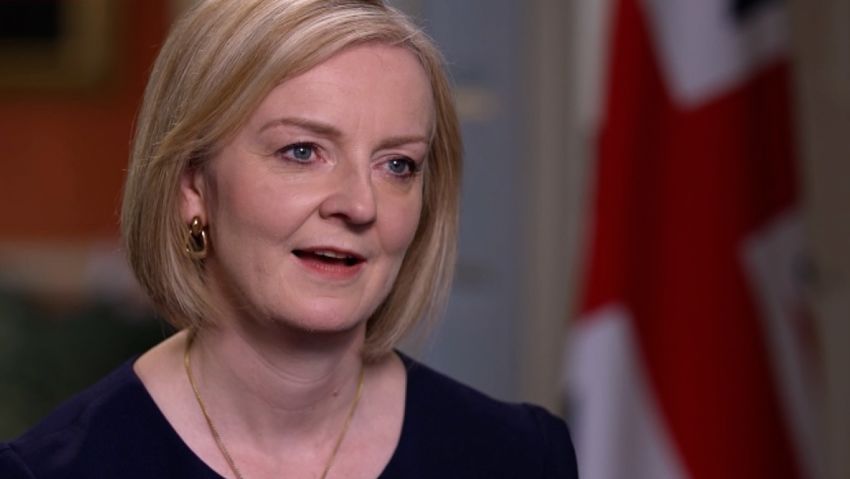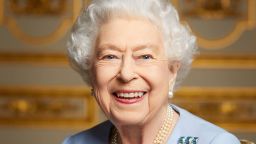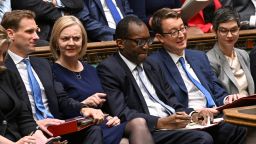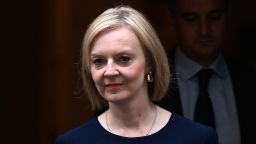Editor’s Note: Frida Ghitis, (@fridaghitis) a former CNN producer and correspondent, is a world affairs columnist. She is a weekly opinion contributor to CNN, a contributing columnist to The Washington Post and a columnist for World Politics Review. The views expressed in this commentary are her own. View more opinion on CNN.
Much of the world watched perplexed earlier this month when former foreign secretary Liz Truss became prime minister of the United Kingdom – a country of roughly 67 million people – after winning an election in which she received just 81,000 votes. Less than three weeks later, the bewilderment turned to horror as Truss made dramatic moves that threatened to send her country into an economic tailspin.
What on Earth is happening with Britain?
Truss replaced the disgraced Boris Johnson simply by winning a majority of Conservative Party members’ support. With that, she became leader of the Tories, the party that still holds a majority in the UK’s House of Commons. But just after moving into the PM’s residence at 10 Downing Street and waiting out the official mourning period following Queen Elizabeth’s death, she announced a series of measures that unleashed panic in financial markets – and among British households worried about their own finances.
In the midst of a wave of inflation that is battering the world and prompting central banks to raise interest rates in hopes of cooling inflationary pressures, Truss’ plan to slash taxes, especially for the wealthiest, amounted to opening a firehose filled with gasoline into that raging economic fire.
Economists and politicians left and right largely agreed that, if not the policy itself, the abrupt rollout and the timing could not have been worse.
Officials in Washington have openly expressed concern about the timing of Truss’ actions. They came at a moment when the world – and the West – stands on a knife’s edge, with Russian President Vladimir Putin annexing large pieces of Ukraine and hinting at using nuclear weapons as his invasion falters. With mysterious explosions causing leaks in the Nordstream pipeline applying further anxiety just ahead of a dreaded winter with gas supply shortages across Europe, all of this is happening when democracy finds itself under pressure the world over.
There couldn’t be a worse time for bumbling experiments in one of the West’s, and the world’s, most important countries.
Truss argues that cutting taxes will spur investment and growth. But even devout proponents of trickle-down economics know that slashing taxes when inflation stands at its highest levels in decades and banks are desperately struggling to contain it is like gorging on candy to prevent a diabetic coma.
As soon as she and her finance minister, Chancellor of the Exchequer Kwasi Kwarteng, revealed the new tax-cut-filled budget, and later said they would eliminate the top tax rate for the highest earners, investors started dumping UK government bonds, anticipating even sharper interest rate hikes to cover the yawning budget hole Truss was excavating.
The Pound Sterling started spiraling down, reaching its lowest level in four decades. The pound, which traded for much of the 1970s at more than two US dollars, fell almost to parity with the greenback.
In what amounted to a statement – and action – branding the UK government’s policy as misguided, the Bank of England, Britain’s Fed, started buying bonds to support the pound and prevent “dysfunction” just days after raising rates to tackle inflation.
To counter the selloff, and to keep pension funds from going under, it vowed to continue the purchases “on whatever scale necessary.” Its chief economist, Huw Pill, said Truss’ cuts would require a “significant monetary policy response.” In other words, Truss’ decision would cause even higher interest rates for everyone.
Even the International Monetary Fund, which more often chides the policies of poor countries, issued a rare rebuke, warning the policy would create worsening inequality and fiscal and monetary policy working at “cross purposes.”
For British households, the soaring interest rates have an even greater impact than they do in the United States. Nearly two-thirds of British mortgages have floating interest rates or expire in the next couple of years. Combined with the soaring costs of home heating, the impact for families could prove calamitous. Truss has announced a cap to help ease the rise in energy costs.
On Thursday, Truss held a series of radio interviews with local stations trying to defend her controversial policies. There was no sign that she intends to back down and her explanations – her overall performance – were largely judged as disastrous.
Truss lacks a commanding presence but seems to try to compensate by her devotion to free market orthodoxy. That worked well for her in winning the party leadership contest, but it is wreaking havoc in governance.
The story of Liz Truss’ rise to the top job and of her dreadful first weeks in office is emblematic of our political times, and not just in the UK. In an era of social media and political polarization, simple dramatic pronouncements – I will cut taxes – project boldness and a strong commitment to ideology, without concessions or nuance. Such naked appeals to the party’s base require appearing tough and impervious to criticism, reluctant to compromise.
Because her victory required convincing only a plurality of party loyalists to vote for her, the stance helped her win the office. Undoubtedly, there were other factors at play. But the contest was reminiscent of a party primary in the US, when voter turnout is heavy on party activists, to the detriment of moderate candidates.
As a result, she came to office with jaw-droppingly low expectations – and she appears to be meeting them. One poll showed only 12% expected her to be a good or great prime minister.
The reinvigorated opposition Labour Party, which has suffered from appalling leadership in the past, can hardly believe its good fortune after struggling for so long to win elections. The last three prime ministers have been Tories.
The polls now show Labour well ahead of the Conservatives, but the next election may be years away.
Truss could still lose power before then. Just like Boris Johnson was toppled by his own party, so could Truss. Other Tories are undoubtedly strategizing. Even Johnson may be grinning, pondering his own prospects.
Beyond the frustration and anger she ignited in the UK, Truss’ ham-handed actions right out of the gate have added yet another reason for worry among Western allies. During a crucial moment in history, when democratic countries are not just standing up against aggressive authoritarianism but trying to make the case that democracy remains the best system of government, it’s imperative for Britain not only to strengthen its economy, but also to demonstrate it has a democracy capable of producing wise and effective governance.




